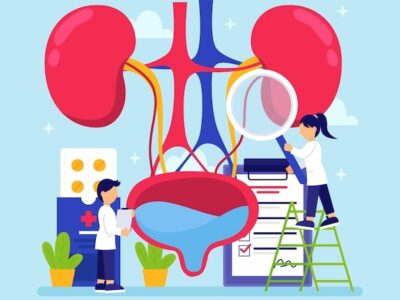Acute Kidney Injury (AKI) is a serious condition where the kidneys suddenly lose their ability to filter waste and maintain a proper balance of fluids, electrolytes, and toxins in the body. It can happen quickly, often within a few hours or days. Understanding the causes, symptoms, and available treatments can help in managing the condition effectively.
Causes of Acute Kidney Injury
Acute Kidney Injury can be triggered by several factors that disrupt the normal function of your kidneys. These causes can be grouped into three main categories: prerenal, intrarenal, and postrenal.
1. Prerenal Causes (Before the Kidneys):
These factors reduce the amount of blood flow to the kidneys, making it difficult for them to filter waste properly. Some common reasons include:
◦ Severe dehydration: Losing too much fluid due to vomiting, diarrhea, or excessive sweating can lower blood flow to the kidneys.
◦ Blood loss: Major surgery, injury, or trauma that leads to significant blood loss can affect kidney function.
◦ Heart problems: Conditions like heart failure, heart attack, or low blood pressure can reduce blood flow to the kidneys.
2. Intrarenal Causes (Within the Kidneys):
These are conditions that directly damage the kidneys, causing them to stop working properly. Some examples include:
◦ Kidney infections: Severe infections, such as sepsis, can harm the kidneys.
◦ Medications: Certain drugs, including nonsteroidal anti-inflammatory drugs (NSAIDs) and some antibiotics, can lead to kidney damage.
◦ Kidney diseases: Conditions like glomerulonephritis, where the kidney’s filtering units get inflamed, can also cause AKI.
◦ Physical injury: Trauma to the kidneys, such as a car accident, can lead to sudden kidney damage.
3. Postrenal Causes (After the Kidneys):
These causes involve blockages in the urinary system that prevent the kidneys from properly filtering and eliminating waste. Common issues include:
◦ Kidney stones: Stones can block the flow of urine, leading to kidney damage.
◦ Enlarged prostate: In men, an enlarged prostate can restrict urine flow and affect kidney function.
◦ Tumors: Growths in the urinary tract or bladder can block urine flow and damage the kidneys.
By understanding these causes, you can better manage the risk factors and protect your kidney health.
Symptoms of Acute Kidney Injury
The symptoms of Acute Kidney Injury can vary depending on the severity of the condition. Some common signs include:
• Decreased urine output: This may be a sign that the kidneys are not filtering waste properly.
• Swelling: Fluid can build up in the body, causing swelling in the legs, ankles, or face.
• Fatigue: You may feel extremely tired or weak, as the kidneys are unable to remove waste effectively.
• Shortness of breath: Fluid buildup in the lungs can make it difficult to breathe.
• Confusion or disorientation: A buildup of toxins in the blood can affect brain function.
Diagnosing Acute Kidney Injury
To diagnose AKI, doctors may perform a variety of tests:
• Blood tests: Elevated levels of creatinine and urea in the blood can indicate poor kidney function.
• Urine tests: Analyzing urine output and composition helps assess kidney performance.
• Imaging tests: Ultrasound or CT scans can help identify any blockages or damage to the kidneys.
Treatment for Acute Kidney Injury
Treatment for AKI depends on the cause, severity, and overall health of the patient. Some common approaches include:
• Managing the underlying cause: Treating the infection, improving blood flow, or stopping harmful medications can help restore kidney function.
• Fluid management: In cases of dehydration or fluid buildup, careful management of fluids is crucial.
• Dialysis: In severe cases, dialysis may be required to remove waste and excess fluid from the body while the kidneys recover.
• Medications: In some cases, medications may be prescribed to manage symptoms or underlying conditions contributing to AKI.
Preventing Acute Kidney Injury
Taking steps to prevent AKI can help protect your kidneys. Some prevention tips include:
• Stay hydrated: Drink enough water, especially when sick or exercising.
• Avoid overuse of medications: Be cautious with over-the-counter painkillers like NSAIDs, which can harm kidneys if used too frequently.
• Manage chronic conditions: Keep conditions like diabetes, high blood pressure, and heart disease under control.
• Eat a healthy diet: A balanced diet supports kidney health and overall well-being.
When to Seek Medical Attention
If you notice symptoms like decreased urine output, swelling, or fatigue, it’s important to seek medical attention promptly. Early detection and treatment of AKI can prevent further damage to the kidneys.
At Gujarat Superspeciality Hospital
If you’re in Vadodara and need expert care for acute kidney injury, the team at Gujarat Superspeciality Hospital is here to help. Our experienced nephrologists ensure that you receive the best possible care. Don’t wait for symptoms to worsen—contact us for a consultation and let us guide you toward better kidney health.

